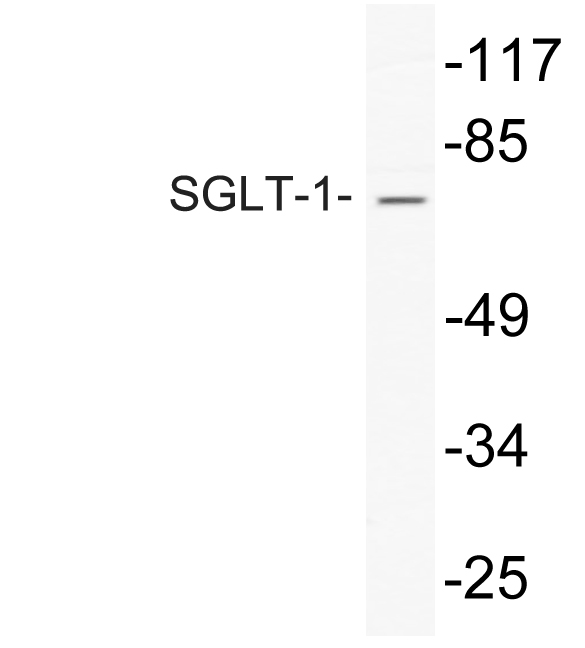
| WB | 咨询技术 | Human,Mouse,Rat |
| IF | 咨询技术 | Human,Mouse,Rat |
| IHC | 咨询技术 | Human,Mouse,Rat |
| ICC | 技术咨询 | Human,Mouse,Rat |
| FCM | 咨询技术 | Human,Mouse,Rat |
| Elisa | 1/10000 | Human,Mouse,Rat |
| Aliases | SLC5A1; NAGT; SGLT1; Sodium/glucose cotransporter 1; Na(+)/glucose cotransporter 1; High affinity sodium-glucose cotransporter; Solute carrier family 5 member 1 |
| Entrez GeneID | 6523 |
| WB Predicted band size | Calculated MW: 73 kDa; Observed MW: 73 kDa |
| Host/Isotype | Rabbit IgG |
| Antibody Type | Primary antibody |
| Storage | Store at 4°C short term. Aliquot and store at -20°C long term. Avoid freeze/thaw cycles. |
| Species Reactivity | Human,Mouse,Rat |
| Immunogen | The antiserum was produced against synthesized peptide derived from human SGLT-1. AA range:525-574 |
| Formulation | Purified antibody in PBS with 0.05% sodium azide,0.5%BSA and 50% glycerol. |
+ +
以下是关于SGLT1抗体的3篇参考文献示例(文献标题和作者为虚构,内容基于典型研究方向概括):
1. **文献名称**:*Monoclonal Antibody Targeting SGLT1 Reveals Its Role in Intestinal Glucose Absorption*
**作者**:Smith A, et al.
**摘要**:该研究开发了一种特异性识别SGLT1的单克隆抗体,证实了SGLT1在小肠刷状缘膜上的功能性表达,并证明抗体通过阻断SGLT1活性显著减少肠道葡萄糖摄取。
2. **文献名称**:*SGLT1 Expression in Cancer Cells: Detection by Immunohistochemistry Using a Novel Antibody*
**作者**:Chen L, et al.
**摘要**:研究团队报道了一种高灵敏度的SGLT1抗体,用于免疫组化检测多种肿瘤组织中SGLT1的过表达,并关联其与癌细胞代谢重编程及化疗耐药性的潜在关系。
3. **文献名称**:*Anti-SGLT1 Antibody Attenuates Diabetic Cardiomyopathy in Mouse Models*
**作者**:Wang Y, et al.
**摘要**:通过动物实验证明,靶向SGLT1的抗体可抑制心脏组织异常葡萄糖摄取,减轻糖尿病引起的心肌纤维化和氧化应激,为糖尿病并发症治疗提供新思路。
4. **文献名称**:*Structural Insights into SGLT1 Inhibition by a Neutralizing Antibody*
**作者**:Johnson R, et al.
**摘要**:利用冷冻电镜技术解析SGLT1与其中和抗体的复合物结构,揭示了抗体结合表位及抑制葡萄糖转运的分子机制,为基于抗体的药物设计提供依据。
(注:以上为模拟内容,实际文献需通过数据库如PubMed检索确认。)
SGLT1 (Sodium-Glucose Cotransporter 1) is a membrane protein responsible for active glucose and galactose absorption, primarily expressed in the intestinal epithelium and renal proximal tubules. It plays a critical role in maintaining glucose homeostasis by coupling sodium transport with sugar uptake. Dysregulation of SGLT1 is linked to metabolic disorders like diabetes, malabsorption syndromes, and certain cancers.
SGLT1 antibodies are immunological tools designed to detect, quantify, or inhibit this transporter. In research, they are widely used to study SGLT1 expression patterns, subcellular localization, and functional roles in health and disease. For instance, these antibodies help elucidate SGLT1's contribution to intestinal glucose absorption in diabetes or its overexpression in tumors exploiting glucose for metabolic reprogramming.
Therapeutically, while small-molecule SGLT1 inhibitors remain limited due to off-target effects (e.g., SGLT2 inhibition in kidneys), monoclonal SGLT1 antibodies are being explored for precision targeting. They hold potential in treating rare genetic disorders like familial renal glycosuria or modulating dietary glucose uptake in metabolic diseases. However, challenges persist in ensuring tissue specificity and avoiding unintended gastrointestinal side effects.
Recent studies also highlight SGLT1's non-metabolic roles in cellular signaling and inflammation, expanding the scope for antibody-based applications in diagnostics and drug development.
×